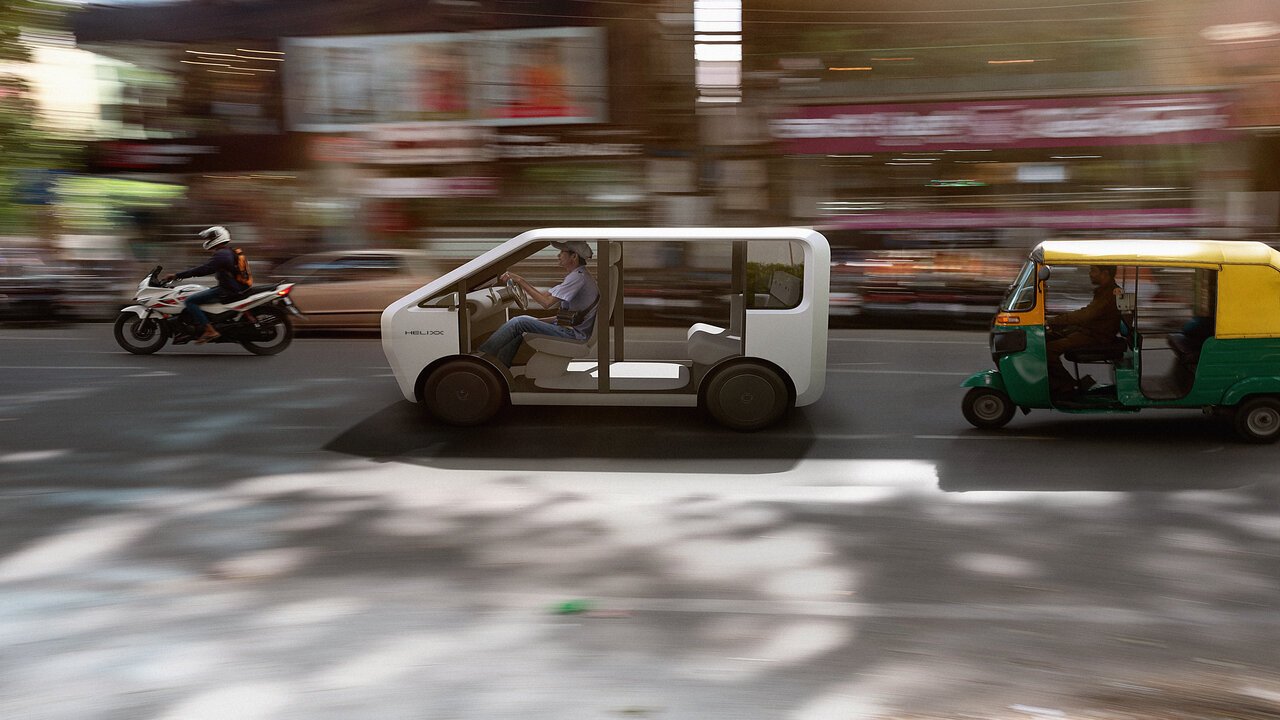Many startups have tried to design and manufacture the next iteration of vehicles and struggled rising against materials costs and delays, increased software challenges, and design complexities. For every Tesla, Nio, Lucid, or Aiways, there's a graveyard of startups from Treser to Elio, Lightyear, and Sono Motors.
But Steve Pegg, CEO of Helixx, sees a way forward. The company is on a mission to accelerate the future of mobility by developing a 'Factory in a Box' solution that enables customers to build mini commercial electric vehicles (EVs) anywhere in the world.
He sees the way forward: small, lightweight vehicles built using Helixx's technology aggregation and enablement platform.
It empowers local businesses to manufacture, supply, maintain and recycle innovative, low-cost, superior-engineered, commercial mini EVs virtually anywhere in the world, to end dependency on heavily polluting, unsafe mini ICE vehicles currently in use.

The Helixx vehicle range will consist of CARGO commercial delivery van, TRUCK pick-up for construction sites, and open-body TUK and closed-body RIDE for ride-hailing.
Revolutionising vehicle manufacturing
Like most people working in mobility startups, Pegg has a wealth of experience, with previous experience at companies like Jaguar Land Rover, Faraday Future, Arrival, Naran Automotive. and Celestial.
With a strong design sensibility, Pegg shared his experience researching mobility in the Asia Pacific, "where it's not called mobility-as-a-service. It's just called life, and it's so unlike our culture of aspirational vehicle ownership."
For EVs, Helixx has its sites set on affordable, serviceable vehicles. While there are better-looking micro vehicles, Helixx's manufacturing plans well make up for the shortfall, bringing vehicles to market where more aesthetic brands have failed. Pegg explained:
"We want to address many scalability problems beset automotive manufacturing with a localised procurement and supply chain strategy."
Pegg and his team started with the first principles around efficiency, replacing labour with automation in response to the growing shortages of factory workers globally.
He shared:
"There are so many technologies available right now. And they're just not being used in traditional manufacturing. Traditional manufacturing is a manual process with a technology layer on top of it, capturing things after the fact. We want to build vehicles in virtual space and have a true digital twin.
The company is developing a future of licensed hubs that manufacture low-cost mini commercial eEVs worldwide.
The power of digital twin
The company is partnering with Siemens Xcelerator to offer a 'Digital Twin' for every single element of the Helixx manufacturing ecosystem.
Creating a digital twin of everything, which entails developing a digital representation of each physical process, component, facility, and environment, will give Helixx a unique advantage through the ability to design, realise and optimise right from first principles.
Every stage of the process, from each initial customer factory site survey, equipment installation, operator training, supply chain management and manufacturing to retail, productivity, service and maintenance and vehicle end-of-life recycling, can be modelled via Siemens' digital twin technologies and validated 'in the cloud' before realisation.
Each microfactory is managed through digital twin technology that offers real-time monitoring at Helixx Mission Control in the UK, ensuring every factory operates at optimum efficiency.
The genius of the Helixx ecosystem is that it removes any element of complexity from the customers and operators in each individual mobility hub.
Helixx factories can be characterised somewhat like Mcdonalds' restaurants; vehicles (like the food at Mcdonald's) are formulaic and modular, with the flexibility to add and delete items in response to different designs.
This means that local owners can partner with local brands or start their own brand using the white label designs, providing "better commercial and cultural traction in those regions."
Furthermore, information sent to the factories and operators will be kept to a functional level via a personalised subscriber experience. Clear, jargon-free instructions will ensure optimum ease and efficiency of production.
Data received in real-time from each Mobility Hub will feed into Mission Control and enable Helixx to instantly spot any quality or production issues, which in traditional automotive manufacturing are only spotted in 'batch testing' when it is effectively already too late to resolve, leading to significant cost implications.
In addition to using AI and Machine Learning controls to predict and prevent issues, Helixx will be able to quickly spot efficiency trends and share the knowledge with all the other hubs in the ecosystem to optimise performance and profitability across the entire network as easily as updating the software of an app.
With another nod to modularity, the vehicles will be powered by swappable batteries – already big in Asia through companies like CATL, Nio, Gogoro, Gojek and Gesits.
This increases configurability and another new business model for the local end user.
Global interest in micro modular EVs
The company is currently exploring the Asian Pacific region but has also had interest in the US Biden's Build Back Better Act incentivises electric vehicles and opens opportunities for expanding the presence of light electric vehicles.
Helixx will manufacture the first vehicles at its concept hub in Oxfordshire with further pilot hubs in the UK and Singapore, producing 10,000 Helixx vehicles a year by 2025.
However, the brand's mission and ambition go far beyond that. Future Licensed factories abroad will build up to 100,000 vehicles annually. If it succeeds, it will offer a compelling blueprint for automotive manufacturing startups.



Would you like to write the first comment?
Login to post comments